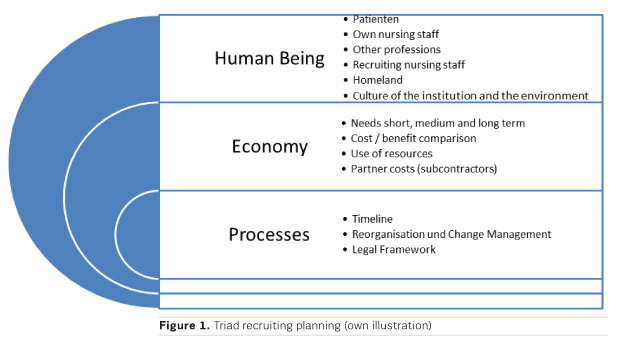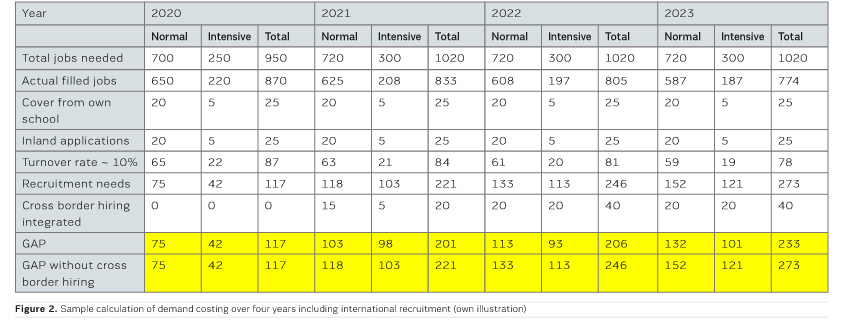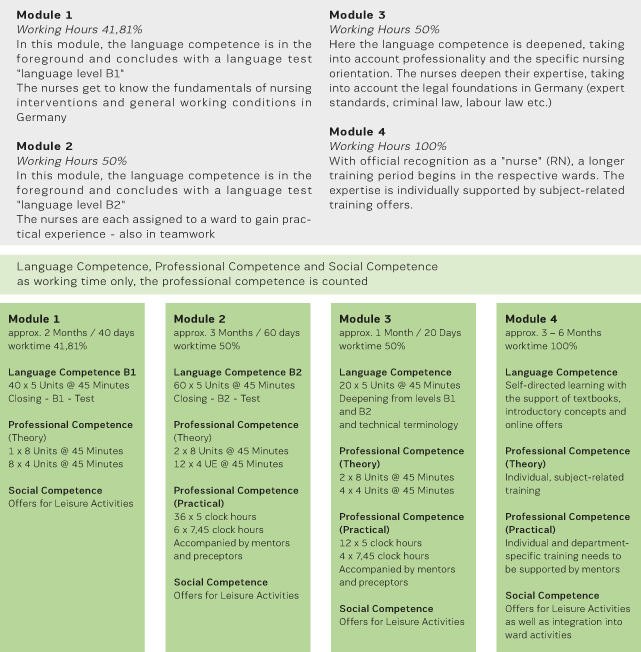Is it possible and feasible to successfully hire and integrate nurses from abroad into a relatively conservative environment?
As a follow up to my previous article in February 2019 “
Nursing on the Move - Cross Border Hiring” with a focus on “Introduction and Background,” this article focuses on how to successfully implement cross border hiring in your own enterprise/institute.
Given the magnitude of the requirement for qualified staff, it’s obvious that the strategic option of recruiting from abroad cannot be the only solution, but merely a building block alongside many other measures.
First, the good news - the volume of cross border recruitment is increasing, so it can be assumed that, with the increase in experience, the opportunity to learn from others and to adopt the concept will be favourable.
The bad news is - it does not work in a straightforward manner. The non-reflected "copy-paste" of concepts of other institutions might lead to failure due to multidimensional complexity.
Why is it then, still worth reading this article? Alternatively, there are an almost confusing number of scientific publications which, although may offer support to gain additional knowledge, usually cannot bring about an individual set of instructions. The information provided in their brochures and with their offers, by the rapidly growing number of recruitment firms is often a very superficial and simply presented programme. Of course, this is understandable, because they want to get into business with you and present their concept as the ultimate one!
I would like to take a different approach, asking you to find a course of action more suitable for yourself and your company with specifically formulated questions.
As a result, individual relevant aspects are highlighted under the triad of human being, economy and processes.
Human being
Organisations, according to the system theory of Parson and Luhmann, are living social systems with their own rules, sensations, and the process of self-creation and preservation of a system. Both patients and their relatives as well as employees in general, are living in such a lived-in social fabric (Luhmann 2017).
The same applies, of course, to the nursing staff to be recruited from their background location. Depending on the volume and the visible and/or perceived other differences, additional discrepancy may arise which considerably influence their integration. In simpler terms, integrating nurses from "distant lands" into a relatively traditional and migration inexperienced institutes on migration process are far more complex than in large institutes with more experience internationally.
Compared to other professions, nursing interacts daily with patients and relatives in stressful situations in a very personal and sometimes intimate network of relationships (Braeseke et al. 2014). Therefore, it is essential to consider patients as stakeholders when selecting from which country the recruitment takes place in such a way as to be of optimum advantage, for example, if a high proportion of the patient-clientele is from "perceived" comparable countries. Another key factor to country selection is the consideration of WHO's "Code of Ethics" for recruiting professionals (WHO 2010).
Questions to be clarified by the institution:
How do you rate the willingness of patients/relatives to allow physical and personal proximity and relationship of nurses originating from the recruitment country? How can you positively influence attitudes (for example, positive media presence, positive country information and qualifications)?
To what extent do employees (especially your own nursing professionals) already have experience with the training and team integration of colleagues from abroad or how can the necessary skills be extended (preparatory workshop, participation in the recruitment and integration process in advance, training and information offers, adapted training concept, contact person for questions and unexplained situations, regular reflection discussions)?
Economy
Before deciding on which country and on which scale you would like to recruit nursing staff from abroad, as an institution, you need to have a clear idea of how high the actual requirements are and how it will evolve in the future (age of staff, turnover, maximum recruitment from your own training centre and within your own country, variation in requirements etc). Determine the gap - see rough example calculation over four years.
A necessary job creation was calculated for the year 2021, with constant inflow through your own school and other domestic recruitment as well as a structure of the foreign recruitment from initially 20 to 40 per year. The result clearly shows that international recruitment as a single additional measure is not enough but, at least, it helps to lessen the problem.
Include hidden costs (such as travel, negotiating contracts, meetings, preceptors, mentoring, etc), but bear in mind that additional cost-intensive measures for inland recruiting are only conditionally effective as the market diminishes.
Select a maximum of two recruiting firms and negotiate a suitable contract package for yourself. Good references, trust, fulfilment of contracts and flexibility in relation to your own needs are essential aspects and have priority over supposedly low prices.
The following packages of tasks are only a few examples and, of course, cannot cover the entire spectrum. Further supporting information for recruitment within Europe can be obtained from EURES (ec.europa.eu/eures/public/en/homepage).
Task packages to be clarified by the institution
Home country:
- Who assumes the responsibility, organisation and costs for the application process in the candidate's home country?
- Who, when and how is the job interview carried out and in which language?
- Who and at what intervals the progress is supported and controlled in the areas of language, legal regulations, departure date, work conditions, work permits and the recognition process?
- What happens if there are unforeseen delays or cancellations of preparatory measures of the candidates?
- How do the candidates finance the language course and final test in their home country and ensure their livelihood during this time (N.B. repayment obligation/ loan dependence on the hiring agency)?
- Who pays the costs of travel, insurance cover and the transitional period until the actual start of work?
Destination country/institution:
Who takes over the organisation, responsibility and costs including possible delays and varying volume of candidates for the following?
- Accomodation
- Advanced language costs
- Costs of receiving the candidates and the initial necessary requirements of authorities and information
- Living expenses and care during the first days/weeks?
Processes
In addition to recruiting and onboarding measures, the process also includes the involvement and training of employees regarding intercultural and diversity aspects. In addition to clear and transparent form of contract, promoting integration for all involved parties with the support of mentoring team, continuous strengthening of language, practical instruction, exchanges with colleagues/designated officials in the institution becomes key importance (Bertelsmann Stiftung 2015).
Practical example:
- After extensive analysis of requirements, the decision was taken to recruit approximately 20 nurses from abroad, twice a year, in addition to other measures
- Ukraine was chosen primarily as a recruiting country
- The collaboration has been carried out, so far, together with a specialised personnel recruiting agency and included language training in the Ukraine
- Accommodation is provided by the Personnel Recruiting Agency
- Long-term cooperation with a local language school in Hannover
- An integration officer and two preceptors were made available in my hospital
Overview of the individual modules as part of the integration
The objectives of the individual modules relate to three competences: language competence, professional competence and social competence. Alongside all the modules, offers are made for leisure activities in order to promote and support the individual social integration.
Key Points
- There is a demand for qualified nurses
- There is no standard procedure for recruiting staff from abroad
- Recruiting and integrating nurses into an institute varies from country to country
- The recruitment process should include further training for employees regarding interculturality and diversity
- There are a number of hidden costs to be taken into consideration when recruiting staff from abroad





![Tuberculosis Diagnostics: The Promise of [18F]FDT PET Imaging Tuberculosis Diagnostics: The Promise of [18F]FDT PET Imaging](https://res.cloudinary.com/healthmanagement-org/image/upload/c_thumb,f_auto,fl_lossy,h_184,q_90,w_500/v1721132076/cw/00127782_cw_image_wi_88cc5f34b1423cec414436d2748b40ce.webp)




